战略和企业家
企业家与品牌战略

、
充 分认 识 品牌 价值
品牌 特 别 是 驰 名 商标 .一 方 面 .能 为企 业带 来 巨大 的 经 济
效 益 ;另一 方 面 .也 是企 业 经 济 实力 的 象征 。一位 经 济 学 家说 过 , 业 家 应 当 引 以 为戒 。
一
个 国 家或 地 区拥 有 商标 的数 量 .特 别 是 拥 有 驰 名 商 标 的数 量 . 标 志 着这 个 国 家 或地 区 商 品经 济 发 展 的 程 度 和 经 济 实 力 。 商 品的注 册 商 标属 知 识产 权 .一 经 问世 即 成 为一 种价 值 符 号 .
知 识 运 用 到 市 场 竞 争 中去 ,取 得 良好 的效 果 。
第 一 阶段 是 创 造 名 牌 .围 绕 这项 工作 ,要 重 视 市 场调 研 .选
量 是 构成 名牌 的核 心 ,离 开 了质 量 . 品牌 难 以成 为名 牌 .没 有质
力 ,但 更重 要 的 是 他们 必 须 能 够 整 合 这些 知识 ,并 将 这 些 整 合 的 准 突破 口 。企 业 的 产 品 首 先必 须 适 销 对路 ;要 狠 抓 产 品 质 量 .质 企 业 竞争 归根 到 底 是 产 品适 应 市 场 需 求 度 的竞 争 , 尤 其 现代 量 的 品牌 始 终 是 不 可 能长 久 的 ;要 借 助 于有 效 的产 品 宣 传 和售 后 市 场竞 争 .那 么 生 产什 么样 的产 品 才 能使 企 业 立 于 不败 之地 ,恐 服 务 ,产 品宣 传 是使 消 费者 由认 识 过 渡到 了解 的 必 经 阶段 ,售 后 怕 离 不 开企 业 家 的 思维 与决 策 。 所 以 ,企 业 家 的思 维 方 式越 来 越 服 务则 是 让 消 费者 信赖 产 品 的保 证 。 我 国现 在 的一 些 企 业对 产 品 同 企 业 的 经 营 成 果 直 接 挂 起 钩 来 .换 句 话 说 ,思 维 就 是 财 富 。 美 国 著名 企 业 家卡 内基 也 说 过 类似 的 名言 .思 维致 富 。 强调
企业家精神与战略管理
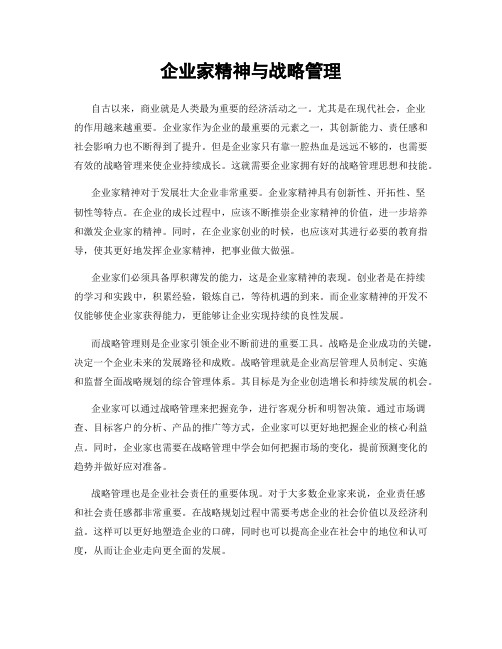
企业家精神与战略管理自古以来,商业就是人类最为重要的经济活动之一。
尤其是在现代社会,企业的作用越来越重要。
企业家作为企业的最重要的元素之一,其创新能力、责任感和社会影响力也不断得到了提升。
但是企业家只有靠一腔热血是远远不够的,也需要有效的战略管理来使企业持续成长。
这就需要企业家拥有好的战略管理思想和技能。
企业家精神对于发展壮大企业非常重要。
企业家精神具有创新性、开拓性、坚韧性等特点。
在企业的成长过程中,应该不断推崇企业家精神的价值,进一步培养和激发企业家的精神。
同时,在企业家创业的时候,也应该对其进行必要的教育指导,使其更好地发挥企业家精神,把事业做大做强。
企业家们必须具备厚积薄发的能力,这是企业家精神的表现。
创业者是在持续的学习和实践中,积累经验,锻炼自己,等待机遇的到来。
而企业家精神的开发不仅能够使企业家获得能力,更能够让企业实现持续的良性发展。
而战略管理则是企业家引领企业不断前进的重要工具。
战略是企业成功的关键,决定一个企业未来的发展路径和成败。
战略管理就是企业高层管理人员制定、实施和监督全面战略规划的综合管理体系。
其目标是为企业创造增长和持续发展的机会。
企业家可以通过战略管理来把握竞争,进行客观分析和明智决策。
通过市场调查、目标客户的分析、产品的推广等方式,企业家可以更好地把握企业的核心利益点。
同时,企业家也需要在战略管理中学会如何把握市场的变化,提前预测变化的趋势并做好应对准备。
战略管理也是企业社会责任的重要体现。
对于大多数企业家来说,企业责任感和社会责任感都非常重要。
在战略规划过程中需要考虑企业的社会价值以及经济利益。
这样可以更好地塑造企业的口碑,同时也可以提高企业在社会中的地位和认可度,从而让企业走向更全面的发展。
总之,企业家精神和战略管理都是构建企业成功的重要因素,它们相互关联相互影响。
良好的企业文化和管理思想,有助于企业家在市场中赢得优势,同时也能让公司不断成长壮大。
企业家精神和战略管理是企业成功的重要保障,是保证创业设计最终成功的重要基础。
从企业家和经营战略看企业的成长要素
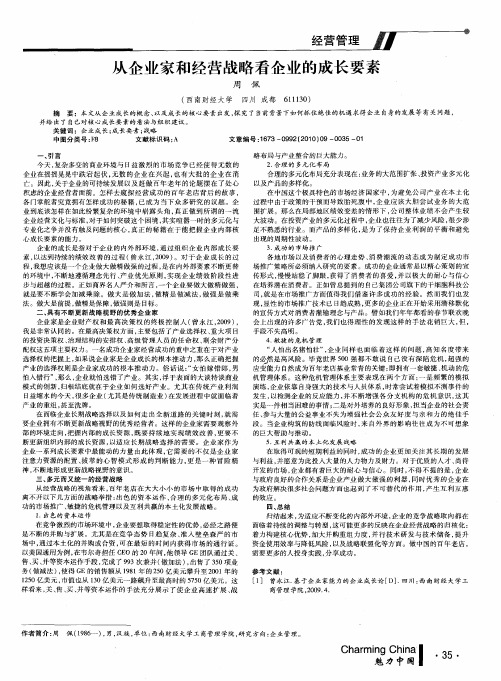
4 敏 捷 的 危 机 管 理 .
《企业家精神与战略思维》

《企业家精神与战略思维》在我国的市场经济中,创业和企业家精神成为越来越多人所追求的生活方式。
而企业家精神作为一种创业意识和经营理念,也成为了企业的核心课题之一。
企业家精神可以是一个人成功创业、并获得高额利润的核心要素,而一个成功企业,则是建立在战略思维和创业精神的基础之上。
因此,在今天的市场环境中,企业家精神和战略思维是不可或缺的一对良好拍档。
一、企业家精神的基本内涵企业家精神是指创业者的内在素质、心理状态、思想观念和行为表现,如自我驱动力、决策能力、创新意识、风险意识、团队合作精神等。
在复杂多变的市场环境下,企业家精神是企业家们不断前行的引擎,它支撑着创业者在面对挑战时的勇气和决心,具有非常重要的意义。
首先,企业家精神具有自我驱动力。
创业者决定自己的方向和目标,并围绕着他们的使命和愿景来制定行动计划。
这种强烈的自我驱动力,不仅推动了创业者的个人成长,也推动了企业的发展。
其次,企业家精神具有决策能力。
创业者要不断地在不同的市场环境下进行决策,需要有决策的能力、眼光和经验。
因此,企业家精神强调创业者需要具备分析问题、提出解决方案和做出决策的能力。
再次,创业者需要具备创新意识。
市场的竞争激烈,企业需要对市场需求进行深入研究,寻找洞察力,提出创新产品和服务,从而满足市场需求,并取得更多的利润。
最后,企业家精神还需要具备风险意识。
创业者在创业过程中面临着风险和不确定性,如果没有强烈的风险意识,就难以应对市场竞争和挑战。
因此,创业者需要对风险进行合理的预判、评估和控制。
二、战略思维对企业的意义战略思维是企业经营中最核心的内容之一,也是企业成功的关键因素之一。
战略思维强调企业要有长远的眼光,要以市场营销为导向、以顾客为中心,制定出对企业发展最为有利的经营方针,将整个企业的资源和能力集中于实现目标上。
做好战略规划,企业就可以明确自己的愿景和目标,寻找高潜力市场和商机,制定合理的吸引顾客的营销策略,加强研发和行业合作,实现企业的高效发展。
国家和企业家的战略合作与经济发展趋势
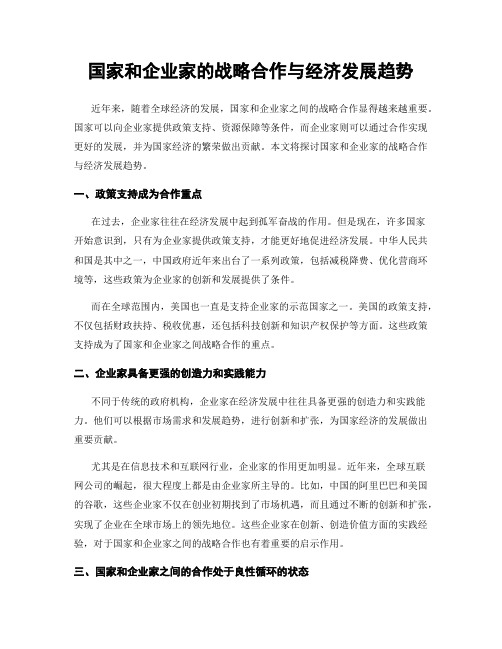
国家和企业家的战略合作与经济发展趋势近年来,随着全球经济的发展,国家和企业家之间的战略合作显得越来越重要。
国家可以向企业家提供政策支持、资源保障等条件,而企业家则可以通过合作实现更好的发展,并为国家经济的繁荣做出贡献。
本文将探讨国家和企业家的战略合作与经济发展趋势。
一、政策支持成为合作重点在过去,企业家往往在经济发展中起到孤军奋战的作用。
但是现在,许多国家开始意识到,只有为企业家提供政策支持,才能更好地促进经济发展。
中华人民共和国是其中之一,中国政府近年来出台了一系列政策,包括减税降费、优化营商环境等,这些政策为企业家的创新和发展提供了条件。
而在全球范围内,美国也一直是支持企业家的示范国家之一。
美国的政策支持,不仅包括财政扶持、税收优惠,还包括科技创新和知识产权保护等方面。
这些政策支持成为了国家和企业家之间战略合作的重点。
二、企业家具备更强的创造力和实践能力不同于传统的政府机构,企业家在经济发展中往往具备更强的创造力和实践能力。
他们可以根据市场需求和发展趋势,进行创新和扩张,为国家经济的发展做出重要贡献。
尤其是在信息技术和互联网行业,企业家的作用更加明显。
近年来,全球互联网公司的崛起,很大程度上都是由企业家所主导的。
比如,中国的阿里巴巴和美国的谷歌,这些企业家不仅在创业初期找到了市场机遇,而且通过不断的创新和扩张,实现了企业在全球市场上的领先地位。
这些企业家在创新、创造价值方面的实践经验,对于国家和企业家之间的战略合作也有着重要的启示作用。
三、国家和企业家之间的合作处于良性循环的状态在实际经济发展过程中,国家和企业家之间的合作处于良性循环的状态。
国家的扶持政策为企业家提供了创造和创新的条件,而企业家的持续发展和壮大,也为国家发展提供了源源不断的动力。
在国家和企业家之间的合作中,也需要充分考虑到双方的利益,赢得双赢,避免不必要的摩擦和利益冲突。
同时,还要充分发挥市场的作用,为企业家提供充分的发展空间。
一般来讲企业家对战略的思考方式和典型
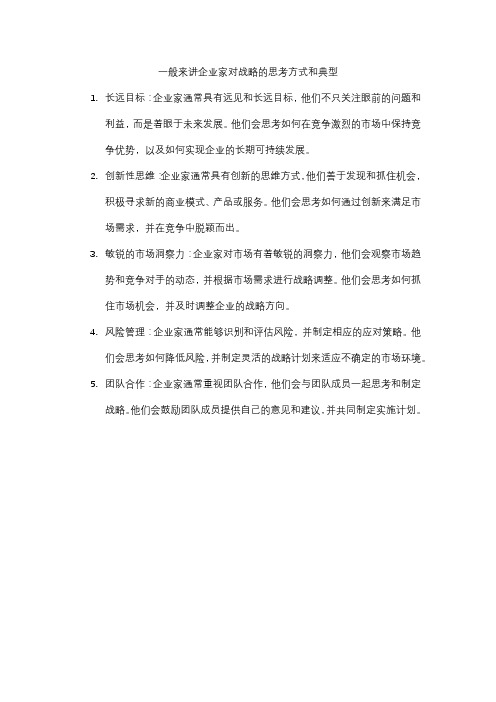
一般来讲企业家对战略的思考方式和典型
1.长远目标:企业家通常具有远见和长远目标,他们不只关注眼前的问题和
利益,而是着眼于未来发展。
他们会思考如何在竞争激烈的市场中保持竞争优势,以及如何实现企业的长期可持续发展。
2.创新性思维:企业家通常具有创新的思维方式,他们善于发现和抓住机会,
积极寻求新的商业模式、产品或服务。
他们会思考如何通过创新来满足市场需求,并在竞争中脱颖而出。
3.敏锐的市场洞察力:企业家对市场有着敏锐的洞察力,他们会观察市场趋
势和竞争对手的动态,并根据市场需求进行战略调整。
他们会思考如何抓住市场机会,并及时调整企业的战略方向。
4.风险管理:企业家通常能够识别和评估风险,并制定相应的应对策略。
他
们会思考如何降低风险,并制定灵活的战略计划来适应不确定的市场环境。
5.团队合作:企业家通常重视团队合作,他们会与团队成员一起思考和制定
战略。
他们会鼓励团队成员提供自己的意见和建议,并共同制定实施计划。
企业家的战略眼光
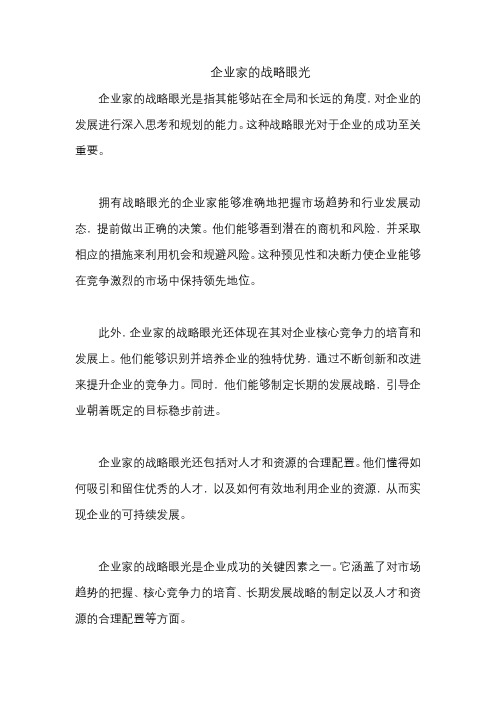
企业家的战略眼光
企业家的战略眼光是指其能够站在全局和长远的角度,对企业的发展进行深入思考和规划的能力。
这种战略眼光对于企业的成功至关重要。
拥有战略眼光的企业家能够准确地把握市场趋势和行业发展动态,提前做出正确的决策。
他们能够看到潜在的商机和风险,并采取相应的措施来利用机会和规避风险。
这种预见性和决断力使企业能够在竞争激烈的市场中保持领先地位。
此外,企业家的战略眼光还体现在其对企业核心竞争力的培育和发展上。
他们能够识别并培养企业的独特优势,通过不断创新和改进来提升企业的竞争力。
同时,他们能够制定长期的发展战略,引导企业朝着既定的目标稳步前进。
企业家的战略眼光还包括对人才和资源的合理配置。
他们懂得如何吸引和留住优秀的人才,以及如何有效地利用企业的资源,从而实现企业的可持续发展。
企业家的战略眼光是企业成功的关键因素之一。
它涵盖了对市场趋势的把握、核心竞争力的培育、长期发展战略的制定以及人才和资源的合理配置等方面。
企业家岗位职责
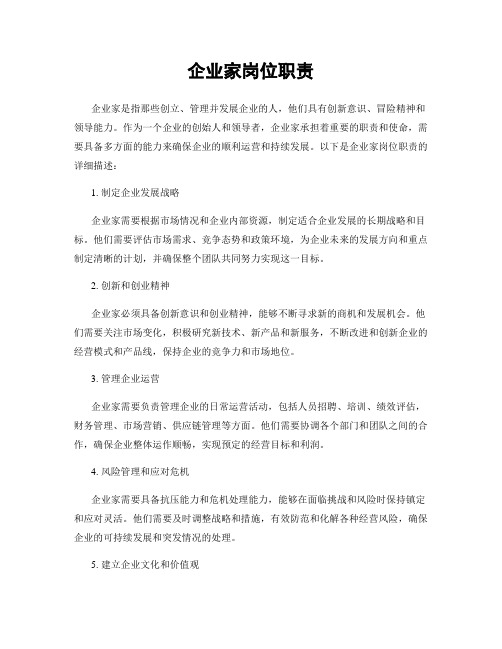
企业家岗位职责企业家是指那些创立、管理并发展企业的人,他们具有创新意识、冒险精神和领导能力。
作为一个企业的创始人和领导者,企业家承担着重要的职责和使命,需要具备多方面的能力来确保企业的顺利运营和持续发展。
以下是企业家岗位职责的详细描述:1. 制定企业发展战略企业家需要根据市场情况和企业内部资源,制定适合企业发展的长期战略和目标。
他们需要评估市场需求、竞争态势和政策环境,为企业未来的发展方向和重点制定清晰的计划,并确保整个团队共同努力实现这一目标。
2. 创新和创业精神企业家必须具备创新意识和创业精神,能够不断寻求新的商机和发展机会。
他们需要关注市场变化,积极研究新技术、新产品和新服务,不断改进和创新企业的经营模式和产品线,保持企业的竞争力和市场地位。
3. 管理企业运营企业家需要负责管理企业的日常运营活动,包括人员招聘、培训、绩效评估,财务管理、市场营销、供应链管理等方面。
他们需要协调各个部门和团队之间的合作,确保企业整体运作顺畅,实现预定的经营目标和利润。
4. 风险管理和应对危机企业家需要具备抗压能力和危机处理能力,能够在面临挑战和风险时保持镇定和应对灵活。
他们需要及时调整战略和措施,有效防范和化解各种经营风险,确保企业的可持续发展和突发情况的处理。
5. 建立企业文化和价值观企业家需要根据企业的使命和愿景,建立并倡导企业文化和价值观,引导员工树立正确的工作态度和价值观念。
他们需要塑造和传承企业的核心价值观,激励团队成员发挥潜力,共同实现企业的长远目标。
6. 建立和维护良好的企业形象企业家作为企业的代表,需要关注和维护企业在社会和市场上的形象和声誉。
他们需要积极参与公益慈善活动,与政府、合作伙伴和社会各界建立良好的合作关系,促进企业的可持续发展和社会责任意识。
7. 激励和培养人才企业家需要关注员工的发展和福祉,为员工提供良好的工作环境和晋升机会,激励他们积极投入工作,发挥自己的才能和潜力。
他们需要注重员工的培训和发展,引导团队成员共同成长,建立专业化的团队,支持企业的快速发展。
企业家的思维方式是企业经营战略的基础 读后感

企业家的思维方式是企业经营战略的基础读后感作为企业经营管理的重要组成部分,企业战略的制定和实施直接影响企业的发展和竞争力。
而企业家的思维方式则是决策者在制定和执行战略时所运用的思考模式和方法论。
企业家的思维方式是企业经营战略的基础,对于企业的成功与失败起着重要的作用。
首先,企业家的思维方式注重创新。
创新是企业发展的驱动力,也是企业战略制定和实施的重要环节。
企业家善于发现市场的新需求、新机会和新趋势,并以此为基础进行产品和服务创新,提高企业的竞争力。
他们敢于冒险和突破,不惧失败,能够将创新融入到企业的战略中,并在市场中获得竞争优势。
其次,企业家的思维方式强调变革。
企业经营战略需要与时俱进,及时调整和变革以适应市场的需求和环境的变化。
企业家具有预见性,能够通过对市场和行业的深入研究和分析,判断未来的发展趋势,及时调整企业的战略方向和资源配置,以保持企业的竞争力和持续发展。
再次,企业家的思维方式注重资源整合。
企业要想实施有效的战略,必须能够整合和合理配置资源。
企业家能够把握资源的变化和市场的需求,善于寻找、整合和管理各种资源,包括人力、物力、财力等,使其能够最大限度地满足企业发展的需要,并在竞争中取得优势。
此外,企业家的思维方式还注重客户导向。
企业要想在市场中立于不败之地,必须满足客户的需求,提供优质的产品和服务。
企业家能够深入了解客户的需求和心理,及时调整产品和服务的策略,与客户保持良好的沟通和互动,建立长期稳定的合作关系。
客户导向的思维方式能够使企业更加关注市场和顾客,从而提高企业的市场占有率和竞争力。
最后,企业家的思维方式强调团队合作。
企业的发展和战略的实施需要一个强大的团队,而一个强大的团队必须由优秀的员工组成,并能够有效地合作。
企业家善于发现和培养人才,能够激发团队成员的潜力,使其在实施战略时发挥最佳的作用。
在读完相关资料和学术论文后,我深刻地意识到企业家的思维方式对于企业战略的制定和实施的重要性。
企业家战略思维名词解释
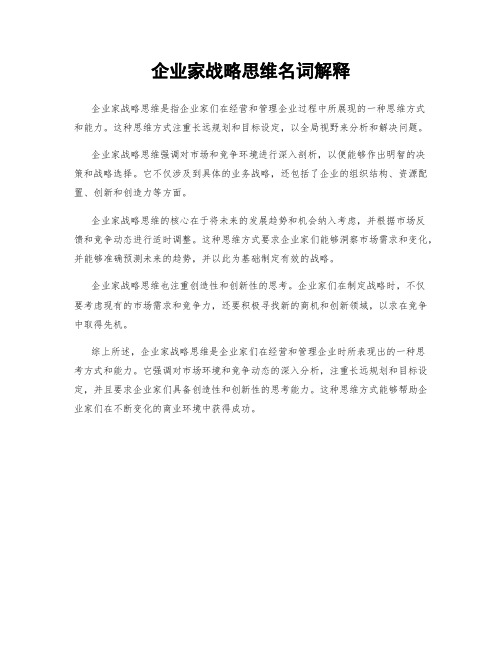
企业家战略思维名词解释
企业家战略思维是指企业家们在经营和管理企业过程中所展现的一种思维方式
和能力。
这种思维方式注重长远规划和目标设定,以全局视野来分析和解决问题。
企业家战略思维强调对市场和竞争环境进行深入剖析,以便能够作出明智的决
策和战略选择。
它不仅涉及到具体的业务战略,还包括了企业的组织结构、资源配置、创新和创造力等方面。
企业家战略思维的核心在于将未来的发展趋势和机会纳入考虑,并根据市场反
馈和竞争动态进行适时调整。
这种思维方式要求企业家们能够洞察市场需求和变化,并能够准确预测未来的趋势,并以此为基础制定有效的战略。
企业家战略思维也注重创造性和创新性的思考。
企业家们在制定战略时,不仅
要考虑现有的市场需求和竞争力,还要积极寻找新的商机和创新领域,以求在竞争中取得先机。
综上所述,企业家战略思维是企业家们在经营和管理企业时所表现出的一种思
考方式和能力。
它强调对市场环境和竞争动态的深入分析,注重长远规划和目标设定,并且要求企业家们具备创造性和创新性的思考能力。
这种思维方式能够帮助企业家们在不断变化的商业环境中获得成功。
企业家在战略管理中的角色及作用

企业家在战略管理中的角色及作用企业家在企业战略的制定、实施、变革等阶段扮演着不同的角色及发挥着重要的作用,主要有:1、在企业战略的制定时期,企业家是企业战略的设计师。
实践证明,战略对企业的发展具有重要意义,决定了企业的生死存亡。
因此,企业家必须对企业发展前景做出准确的预测,制定符合企业发展的战略。
企业家在企业战略的制定时期具有不可替代的重要作用,是企业战略的设计师、制定者。
2、在企业战略制定完成后,企业家是企业战略的倡导者。
企业家要做一个好的战略制定者,但他们不是战略的执行者,承担战略执行重要责任的主要是企业的中层管理者。
因此企业家应当与企业的中层管理者进行战略沟通,战略执行力事关战略实施的效果。
所以说,企业家是企业战略的倡导者,是中层管理人员的导师和教练。
3、在企业战略的实施时期,企业家是企业战略的实践者。
战略的贯彻与战略制定之间是个有机过程。
“企业家必须一手抓企业的战略制定,一手抓企业的战略执行,做到两手抓,两手都要硬。
这是企业家进行战略制定高度个性化的方法,是企业战略的实践者。
4、在企业战略的实施过程中,企业家是激励者。
企业家在战略实施的过程中及时对参与人员予以适当的激励,以更好的促使企业战略的实现。
5、在企业战略的实施过程中,企业家是控制者。
在战略实施过程中,企业家要随时关注战略实施情况,使实施不偏离预定目标,同时对于实施中出现的问题及时解决。
6、在企业战略的变革时期,企业家是企业战略的变革者。
环境是不断变化的,当企业战略不适合企业发展时,企业家要及时做出调整。
因此企业家对战略变革的时机把握好,及时对企业战略进行变革,保证企业的发展。
因此,企业家是企业战略的变革者。
企业家在战略管理中扮演多种角色,发挥着巨大的作用。
2016年6月。
战略管理与企业家精神

管理者的管理风格和与公司战略相关的管理活动不具有那种旨在提高顾客满意度相获得持久竞争优势的企业家精神,那么,公司的战略就不可能真正以市场和客户作为战略的推动因素。
公司的战略是动态的,一点一滴地形成,然后,公司的管理者是在早找到改善的方式之后再进行改造.或者,当公司的管理者认为必须调整公司的经营途径以适应外界变化的环次时,再对公司的战略进行改造。
卓越的战略制定与其说是从外往里还不如说是从里往外。
在制定战略时不能表现出一种企业家精神的第二个危险是:往往会导致从内往外的战略思维。如果公司的管理者缺乏企业家技能或者在这方面保持一种谨慎的态度,那么,他们往往将他们绝大多数的时间和精力放在公司的内部事务上:解决内部的问题,改善组织过程和程序,关注日常的管理杂务。他们决定采取的战略行动往往在很大程
公司的管理者接纳新战略机会的大胆程度,强调以创新战胜竞争对手的程度,以及提倡采取适当的行动来改善公司业绩的程度,是公司管理者企业家精神最好的睛雨表。企业家型的战略制定者往往愿意成为某种行动的首倡者,愿意作第一个尝螃蟹的人.对新的市场和顾客需求的最新发展态势做出最快的反应并且表现出一种机会主义的风格。他们愿意谨慎地冒风险,制定开先河式的战略。相反,不情愿的企业家往往厌恶风险,他们往往是行动的后发者,期望他们能够很快赶上先发者,并且非常留心他们如何才能避免他们认为先发者会犯的那种所谓的“错误”。他们更欣赏累进式的战略,而不太喜欢大胆彻底的战略。
制定战略实际上是一项锻炼企业家精神和从外到内的战略思维的一项活动。战略制定中,公司的管理者所面临的挑战是将所制定的战略同以下一些外部推动因素紧密联结起来:顾客的偏好,竞争对手最近所采取的行动,最新的技术能力,新出现的有吸引力的市场机会,最新出现的业务环境。如果公司的管理者不具有上乘的企业家精神,不去研究市场趋势,不去倾听顾客的需求,不去提高公司的竞争力,不去调整公司的活动.将公司的活动瞄准在由市场环境和顾客偏好决定的方向上,那么,公司的战略就不能同公司现时和未来的环境很好地协调起来。因此,优秀的战略制定工作和公司管理者的企业家精神是不可分割的,二者缺一不可。
张学良对东北贸易的人才战略和企业家精神
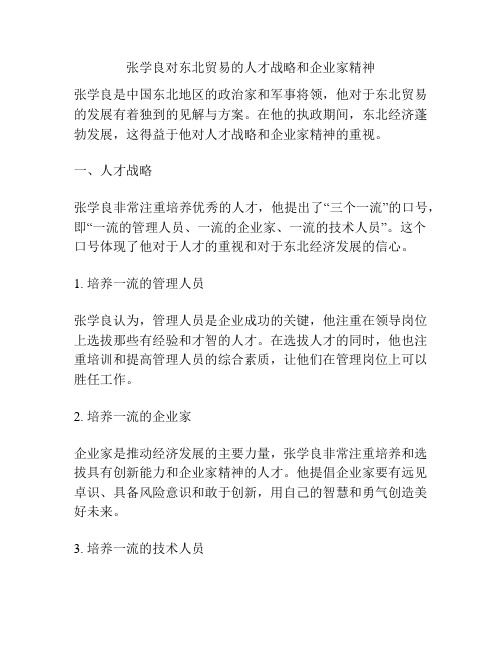
张学良对东北贸易的人才战略和企业家精神张学良是中国东北地区的政治家和军事将领,他对于东北贸易的发展有着独到的见解与方案。
在他的执政期间,东北经济蓬勃发展,这得益于他对人才战略和企业家精神的重视。
一、人才战略张学良非常注重培养优秀的人才,他提出了“三个一流”的口号,即“一流的管理人员、一流的企业家、一流的技术人员”。
这个口号体现了他对于人才的重视和对于东北经济发展的信心。
1. 培养一流的管理人员张学良认为,管理人员是企业成功的关键,他注重在领导岗位上选拔那些有经验和才智的人才。
在选拔人才的同时,他也注重培训和提高管理人员的综合素质,让他们在管理岗位上可以胜任工作。
2. 培养一流的企业家企业家是推动经济发展的主要力量,张学良非常注重培养和选拔具有创新能力和企业家精神的人才。
他提倡企业家要有远见卓识、具备风险意识和敢于创新,用自己的智慧和勇气创造美好未来。
3. 培养一流的技术人员技术人员是现代化经济发展的基础,张学良认为,东北经济要不断地引进和培养一流的技术人才。
他鼓励企业在技术方面进行大力投资,培养现代化的技术人才,让他们成为企业发展的核心力量。
二、企业家精神张学良提倡企业家精神,他认为企业家在推动经济发展中具有至关重要的作用。
他认为一位优秀的企业家要具备以下几方面的素质。
1. 敢于冒险在张学良的眼中,企业家是勇敢和冒险的代表。
他鼓励企业家要敢于冒险和试错,要有开拓进取的精神和勇气。
2. 远见卓识企业家要有远见卓识的眼光,预测未来市场的趋势和变化。
他要敏锐地捕捉市场动态,从中寻找机遇,为企业创造更多的价值。
3. 创新能力张学良认为,创新是企业的灵魂,企业家要敢于突破常规,勇于创新。
只有不断地创新,才能不断地提高企业的核心竞争力。
4. 诚信经营诚信经营是企业的基石,张学良重视企业家诚信经营的精神。
他认为企业家要以信誉和诚信为基础,用真诚的态度和负责的态度来经营企业。
总之,张学良对人才战略和企业家精神的重视是东北经济发展成功的关键。
企业家与战略管理

竞争者
3 制定职能战略
营销战略:市场开发新 渗透 范围 渠道 价格 促销
研发战略:技术领先/技术追随
生产营运:自制/外包
生产组织方式
人力资源战略: 对高层技术与管理人员: 外部高价招聘合格者/内部培训 一般人力资源培训:自己组织/外包 用人政策:长期合同/临时雇用 财务战略:
重点:功能实现方式与程度的相近性;
价格可大幅调整:
成本可降低/利润边际高
商业合作伙伴的价格谈判能力上/下游
产品的相对重要性
行业相对集中度
替代品/同类产品的相似性
一体化的能力
2 经营条件研究优势与劣势
资源: 物质条件; 资金及资金动员能力 人力资源及其利用 技术:设备 产品的技术水平;专利技术;研
发能力; 组织资本:信息网络;组织结构的适应性;组
织调整变革的可能性 社会资本:关系网络;信誉信任:交易成本
文化:文化的强度对员工行为的影响程 度
文化的特点价值观
文化改造的可能性
2 制定和选择战略
1制定整体战略:考虑到的优势与劣势;为
了更有效地管理环境中的机会与威胁;而 开发的长期规划 它包括明确的使命 确定 可达到的目标 选择发展方向领域 确立发 展途径发展模式
3 选择发展方向
SWOT分析及相关战略选择:
机会opportunity
3 防御战略WO 发现并利用机会 弱势 weakness
4 撤退战略WT
1 扩张战略SO
优势 strength 2 分散战略ST 其他市场寻找机会
威胁threat
发展方向选择:
专业化发展能力扩张扩张成本/收益分析; 行业生产能力过剩
关于战略的中国企业家故事

关于战略的中国企业家故事
中国企业家是中国经济发展的重要推动者和支柱,他们的战略智慧和成功故事
为我们树立了榜样。
以下是一些关于战略的中国企业家故事。
1. 马云:马云是中国电子商务巨头阿里巴巴的创始人。
他通过战略决策将阿里
巴巴从一个小公司发展为全球最大的电子商务平台之一。
马云在创办阿里巴巴初期,选择了一个独特的商业模式,即将中国农村市场作为主要目标群体,通过发展在线批发和零售市场,为中国广大农村地区带来商机。
这种战略眼光和创新思维使阿里巴巴取得了巨大成功。
2. 雷军:雷军是中国智能手机制造商小米科技的创始人。
他的成功故事凸显了
创新和战略的重要性。
雷军将小米打造成一个以互联网为基础的生态系统,不仅销售智能手机,还销售其他智能设备和互联网服务。
雷军坚持以高性价比和创新为核心价值,通过战略合作、品牌营销和供应链优化,小米在竞争激烈的手机市场取得了长足发展。
3. 丁磊:丁磊是中国在线游戏巨头网易的创始人。
他的故事展示了对市场需求
的敏锐洞察力和战略眼光。
丁磊在网易创立初期,意识到中国市场对在线游戏的需求,并迅速调整战略,专注于开发和推广在线游戏。
通过引入国际知名游戏和自主研发的游戏,网易成为中国在线游戏市场的领导者之一。
丁磊的战略决策推动了网易的快速增长和市值提升。
这些成功的中国企业家故事展示了战略决策在发展企业中的重要性。
通过正确
的战略选择和创新思维,他们在竞争激烈的市场中取得了成功,并为中国经济的发展做出了重要贡献。
这些企业家的故事激励着我们在自己的创业和发展道路上勇往直前。
企业家精神 战略家思维

企业家精神战略家思维作者:李雪来源:《中国知识产权》2016年第01期MBA工商管理硕士,专利高级工程师,高级知识产权管理师,从事十年多相关的知识产权工作,荣获美的集团知识产权科技标兵等称号。
担任安徽省知识产权专家顾问团专家和重庆理工大学兼职教授等社会职务,同时也是国家知识产权专家库专家参评候选人选,“百千万知识产权人才工程”百名高层次人才培养人选合肥美的电冰箱有限公司位于安徽省会合肥,是美的集团旗下一家以研发、制造和销售冰箱及相关冷冻产品的家电企业,是中国最具规模的冰箱生产基地和出口基地之一。
美的冰箱也是国家高新技术企业和国家知识产权示范企业。
在国内家电行业竞争日益激烈的今天,品牌战一直是众多企业所争相角逐的,在这期间,知识产权无疑成为了最有力的武器。
而张世国——现任合肥美的电冰箱有限公司>>>IP中心负责人,就是美的冰箱手持这把武器的领军人物。
2007年初,在张世国刚刚加入美的的时候,美的冰箱知识产权工作才刚起步,一年申请专利不超过30件。
丰富的知识产权管理工作经验,让张世国意识到构建知识产权团队工作刻不容缓。
于是,在加入美的后不久,他就组建了一支专业的知识产权团队-美的冰箱IP中心(隶属于公司研发中心)。
次年,张世国的团队为美的冰箱申报了“国家高新技术企业”并顺利通过;2011年,通过这支知识产权团队的不懈努力,美的冰箱更是被国家知识产权局认定为国家知识产权试点单位,继而成为国家知识产权示范单位之一。
ChinaIP:作为美的电冰箱有限公司IP中心的负责人,您的主要工作职责有哪些?在您的带领下,取得了哪些成绩?张世国:目前我的主要工作是统筹公司所有知识产权管理工作,包括统筹美的集团旗下合肥美的、合肥华凌、广州华凌和湖北美的三地四个公司的知识产权管理工作,即负责制定公司知识产权战略规划,知识产权体系搭建,专利申请、挖掘、布局、分析,专利风险防控及竞争对手监控、专利诉讼应对、专利资产运营,以及专利团队建设和专利相关培训等。
企业家与企业战略家
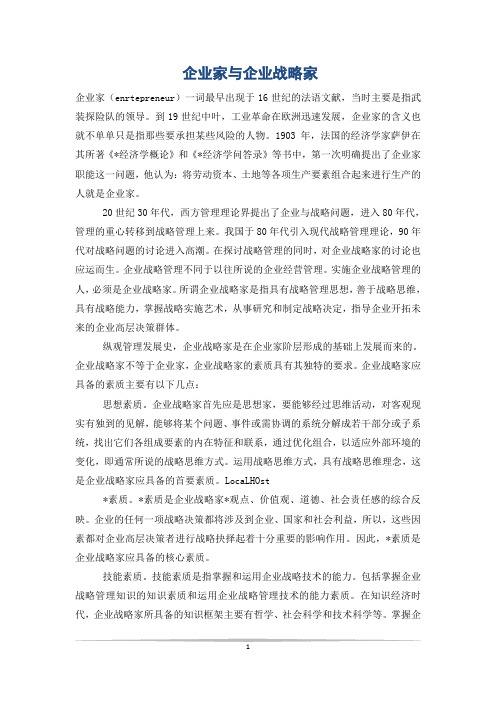
企业家与企业战略家企业家(enrtepreneur)一词最早出现于16世纪的法语文献,当时主要是指武装探险队的领导。
到19世纪中叶,工业革命在欧洲迅速发展,企业家的含义也就不单单只是指那些要承担某些风险的人物。
1903年,法国的经济学家萨伊在其所著《*经济学概论》和《*经济学问答录》等书中,第一次明确提出了企业家职能这一问题,他认为:将劳动资本、土地等各项生产要素组合起来进行生产的人就是企业家。
20世纪30年代,西方管理理论界提出了企业与战略问题,进入80年代,管理的重心转移到战略管理上来。
我国于80年代引入现代战略管理理论,90年代对战略问题的讨论进入高潮。
在探讨战略管理的同时,对企业战略家的讨论也应运而生。
企业战略管理不同于以往所说的企业经营管理。
实施企业战略管理的人,必须是企业战略家。
所谓企业战略家是指具有战略管理思想,善于战略思维,具有战略能力,掌握战略实施艺术,从事研究和制定战略决定,指导企业开拓未来的企业高层决策群体。
纵观管理发展史,企业战略家是在企业家阶层形成的基础上发展而来的。
企业战略家不等于企业家,企业战略家的素质具有其独特的要求。
企业战略家应具备的素质主要有以下几点:思想素质。
企业战略家首先应是思想家,要能够经过思维活动,对客观现实有独到的见解,能够将某个问题、事件或需协调的系统分解成若干部分或子系统,找出它们各组成要素的内在特征和联系,通过优化组合,以适应外部环境的变化,即通常所说的战略思维方式。
运用战略思维方式,具有战略思维理念,这是企业战略家应具备的首要素质。
LocaLHOst*素质。
*素质是企业战略家*观点、价值观、道德、社会责任感的综合反映。
企业的任何一项战略决策都将涉及到企业、国家和社会利益,所以,这些因素都对企业高层决策者进行战略抉择起着十分重要的影响作用。
因此,*素质是企业战略家应具备的核心素质。
技能素质。
技能素质是指掌握和运用企业战略技术的能力。
包括掌握企业战略管理知识的知识素质和运用企业战略管理技术的能力素质。
企业家战略合作协议书范本

企业家战略合作协议书范本甲方(合作方):______________________乙方(合作方):______________________鉴于甲方与乙方均为独立法人,具有合法的经营资格,且双方均有意愿在各自领域内进行战略合作,以实现资源共享、优势互补、共同发展的目的,经双方友好协商,特订立本战略合作协议书。
第一条合作目的1.1 双方通过战略合作,共同开拓市场,提升品牌影响力,增强竞争力。
1.2 双方通过资源共享,实现技术交流与创新,提高产品和服务质量。
第二条合作范围2.1 双方同意在以下领域内开展合作:2.1.1 市场开发与推广。
2.1.2 产品与服务的联合研发。
2.1.3 技术交流与培训。
2.1.4 信息共享与交流。
2.1.5 其他双方认为有必要合作的领域。
第三条合作方式3.1 双方应根据本协议约定的合作范围,制定具体的合作计划,并按计划实施。
3.2 双方应指定专人负责合作事宜的联络和协调。
3.3 双方应定期召开会议,讨论合作进展情况,并解决合作过程中出现的问题。
第四条合作期限4.1 本协议自双方签字盖章之日起生效,合作期限为____年。
4.2 合作期限届满,如双方均有意愿继续合作,可续签本协议。
第五条权利与义务5.1 甲方的权利与义务:5.1.1 甲方应按照约定提供合作所需的资源和支持。
5.1.2 甲方有权参与合作项目的决策和管理。
5.2 乙方的权利与义务:5.2.1 乙方应按照约定提供合作所需的资源和支持。
5.2.2 乙方有权参与合作项目的决策和管理。
第六条保密条款6.1 双方应对在合作过程中知悉的对方商业秘密和技术秘密负有保密义务。
6.2 未经对方书面同意,任何一方不得向第三方披露、泄露或使用对方的商业秘密和技术秘密。
第七条违约责任7.1 如一方违反本协议约定,应承担违约责任,并赔偿对方因此遭受的损失。
7.2 违约责任的承担方式由双方协商确定。
第八条争议解决8.1 双方在履行本协议过程中发生争议,应通过友好协商解决。
- 1、下载文档前请自行甄别文档内容的完整性,平台不提供额外的编辑、内容补充、找答案等附加服务。
- 2、"仅部分预览"的文档,不可在线预览部分如存在完整性等问题,可反馈申请退款(可完整预览的文档不适用该条件!)。
- 3、如文档侵犯您的权益,请联系客服反馈,我们会尽快为您处理(人工客服工作时间:9:00-18:30)。
战略和企业家文件编码(008-TTIG-UTITD-GKBTT-PUUTI-WYTUI-8256)STRATEGY AND ENTREPRENEURSHIP: OUTLINES OF AN UNTOLD STORYSaras D. SarasvathyUniversity of WashingtonS. VenkataramanUniversity of VirginiaInvited book chapter in the Strategic Management Handbook editedby Hitt .(Revised December 10, 2000)In his book “Invention,” Professor Norbert Wiener (1993), commenting on the relative importance accorded to individuals and institutions in historical narratives of science and inventions, asks us to imagine Shakespeare’s “Romeo and Juliet” without either Romeo or the balcony.1 The story is just not the same. He likens much of the study of the economic history of science and accounts of inventions as “all balcony and no Romeo.” The balcony for Norbert Wiener captures the context in which the story unfolds – the culture, the institutions, the constraints and the catalysts that move the plot forward and thicken it. Romeos, for Wiener, play the leading parts in the story, because there is a strong fortuitous element to inventions and there is no inevitability that a possible discovery will be made at a given time and space. Take away either one, Romeo or the balcony, and the whole story falls apart. In a similar vein, we would liken studies of strategic management to “all balcony and no Romeo.” But if we accuse strategic management of being “all balcony and no Romeo,” strategic management scholars could legitimately accuse entrepreneurship of being “all Romeo and no balcony.”1 Weiner took his inspiration from the work of the English writer, Rudyard Kipling.In this chapter we wish to suggest a point of view from entrepreneurship that will allow strategic management scholars to accommodate more Romeos in their stories. Although these two fields have much to offer each other (trade in balconies and Romeos), they have developed largely independent of each other. We wish to suggest that entrepreneurship has a role to play in strategic management theory and that strategic management theory enriches our understanding of the entrepreneurial process, although this latter aspect will not be the focus of this chapter.One useful way of thinking about entrepreneurship is that it is concerned with understanding how, in the absence of markets for future goods and services, these goods and services manage to come into existence (Venkataraman, 1997). To the extent value is embodied in products and services, entrepreneurship is concerned with how the opportunity to create “value” in society is discovered and acted upon by some individuals. As Wiener has noted (Wiener, 1993: 7), at the beginning stages of a new idea, the effectiveness of the individual is enormous: “Before any new idea can arise in theory and practice, some person or persons must have introduced it in their own minds… Theabsence of original mind, even though it might not have excluded a certain element of progress in the distant future, may well delay it for fifty years or a century.”The field of strategic management can be usefully described as having to do with the “methods”used to create this “value” and the ensuing struggle to capture a significant share of that “value” by individuals and firms. Thus, if we understand entrepreneurship and strategic management as the fields that together seek to describe, explain, predict and prescribe how value is discovered, created, captured, and perhaps destroyed, then there is not only much that we can learn from each other, but together we represent two sides of the same coin: the coin of value creation and capture.One side of the coin, namely strategic management, has to do with the achievement of ends – obtaining market share, profit, and sustained competitive advantage. The other side of the coin, namely entrepreneurship, has to do with the achievement of beginnings –creating products, firms, and markets. But the clarity and complexity with which an author connects beginnings and ends is what makes a great story. We believe the really interesting story between strategicmanagement and entrepreneurship has not yet been told. The main reason for this is that in general, creation calls for very different modes of thinking and behavior than capture and sustenance over time. Yet the creation process not only determines certain powerful tendencies for survival and growth, but some elements of it also persist over long periods of time, subtly and substantially influencing the selection and achievement of later ends. Carefully bearing in mind that large expanses of strategic management may have no overlap with entrepreneurship2, this chapter nevertheless focuses exclusively on where entrepreneurship and strategic management overlap.In the preface to their 1994 book, Rumelt, Schendel, and Teece identify the subject matter of strategic management as "the purposeful2 It is worth pointing out here that when discussing creative processes in the economic domain, strategy is a sub-set of entrepreneurship. For example, for any given new technical invention there are, at least in theory, an infinite number of product possibilities that may flow out of that invention. But, in practice, only a finite sub-set of those possibilities will come into existence. Of those new products that come into existence, only a sub-set is introduced by existing firms. Indeed, a large number of new products are introduced into the economy by new firms. Strategy essentially focuses on existing firms and theactivities of existing firms. Entrepreneurship, on the other hand, has been focusing attention on the creative process, particularly of new firms. Where they overlap is at the nexus of the creative process of existing firms. Thus, each field has vast terrains that do not overlap.direction and natural evolution of enterprises." (Rumelt, et. al., 1994) They further identify four fundamental issues that comprise a research agenda in strategic management:1. Firm Behavior3How do firms behave Or, do firms really behave like rational actors, and, if not, what models of their behavior should be used by researchers and policy makers2. Firm DifferentiationWhy are firms different Or, what sustains the heterogeneity in resources and performance among close competitors despite competition and imitative attempts3. Firm ScopeWhat is the function of or value added by the headquarters unit ina diversified firm Or, what limits the scope of the firm4. Firm Performance3 The choice of the term firm and the choice of focusing on the pre-existing firm by Rumelt, Schendel, and Teece (1994) only affirm our assertion in the previous footnote.What determines success or failure in international competition Or, what are the origins of success and what are their particular manifestations in international settings or global competitionIn answering the four questions stated above, economics and strategic management theories generally tend to focus on rational decision making (whether unbounded or bounded and linear or non-linear) based on causal reasoning and the logic of prediction. Our explication of entrepreneurship, however, rests upon creative action based on effectual reasoning and the logic of control.We have elsewhere identified the subject matter of entrepreneurship as having to do with the exploitation of opportunities for creating hitherto non-existent economic artifacts (Venkataraman, 1997; Shane and Venkataraman, 2000; Sarasvathy and Simon, 2000; Sarasvathy, 2001). Depending upon the completeness and/or consistency of the larger environment, entrepreneurial opportunities may have to be recognized or discovered or created. In this chapter, we first examine these three types of action connected with entrepreneurial opportunities through a framework based on the preconditions for their existence. Thereafter, we explore the four fundamental issues of strategicmanagement listed above from an "entrepreneurial opportunity" perspective.ENTREPRENEURIAL OPPORTUNITIES4The Oxford English Dictionary defines opportunity as “a time, juncture, or condition of things favorable to an end or purpose, or admitting of something being done or effected.” As is clear from this definition, at the minimum, an opportunity involves an end or purpose, and things favorable to the achievement of it. An entrepreneurial opportunity consists of the opportunity to create future economic artifacts and as such, involves a demand side, a supply side and the means to bring them together. Therefore, in the case of an entrepreneurial opportunity, the “things favorable” consist of two categories: (a) beliefs about the future; and (b) actions based on those beliefs. In sum, an entrepreneurial opportunity consists of:1. Supply side: New or existing idea/s or invention/s;2. Demand side: One or more ends –may be subjective (endogenous)aspirations or objective (exogenous) goals or both;54 This section summarizes our more detailed exposition titled "Three views of entrepreneurial opportunity."3. Beliefs about things favorable to the achievement of those ends;and,4. Possible implementations of those ends through the creation of neweconomic artifacts.At this point, it is important to note that entrepreneurial opportunities exist at all levels of the economy –individual, corporate, and macroeconomic. For example, the invention of the internet not only led to the identification and creation of entrepreneurial opportunities for individuals and firms, but also opportunities for the US economy as a whole in terms of more effective globalization. Similarly, Adam Smith's exposition of the "invisible hand" guided both economic policy at the government level as well as the decisions of individual economic agents and firms in the creation of "free market" institutions.5 The entrepreneur not only has an idea for a product or firm, but also has some personal aspirations and/or goals in pursuing the opportunity. Goals could be as specific as making an IPO in five years to creating a legacy for their children. And aspirations could range from making money to enjoying an independent lifestyle to changing the world. Furthermore, these aspirations and goals could change and new ones could emerge over time.But entrepreneurial opportunities are extremely context specific. What might be an opportunity today in the Ukraine may not be an opportunity at all in the US today or even in the Ukraine tomorrow. This means that entrepreneurial opportunities do not necessarily lie around waiting to be discovered by the serendipitous entrepreneur who stumbles upon them or even to be “divined” by entrepreneurial geniuses, if any such geniuses exist. Instead, entrepreneurial opportunities are often residuals of human activities in non-economic spheres and emerge contingent upon conscious actions by entrepreneurs who continually strive to transform the outputs of those non-economic activities into new products and firms and in the process fulfil and transform human aspirations into new markets.In other words, before there are products and firms, there is human imagination; and before there are markets, there are human aspirations. Creative outputs of the human imagination in every realm of human action be it the arts or the sciences, sports or philosophy, become inputs for the economic domain. It is an empirical fact that profits for the individual and the firm, and welfare for the economy come as much from Jerry Seinfeld’s jokes and Michael Jordan’s baskets,as from great technological inventions and the tearing down of the Berlin wall. Similarly, human aspirations may range from career goals and individual prosperity to freedom and justice and the good life for all and peace on earth. These aspirations have to be transformed into demand functions and markets for specific economic artifacts such as particular goods, services and firms. Entrepreneurship consists in matching up the products of human imagination with human aspirations to create markets for goods and services that did not exist before the entrepreneurial act.In fact, most entrepreneurial opportunities, be they supply based or demand based, do not originate in the economic domain at all. For example, the internet was developed as a way to facilitate communication between defense scientists and remained out of the economic domain for several years. The mere existence of the internet did not guarantee the development of e-commerce. Rather, this artifact created to solve a political problem (namely, defense), had to be transformed through several intentional and unintentional activities to become a universe of entrepreneurial opportunities in the economic domain. To cite another example, entrepreneurs such as Robert Lucas transform literary andartistic endeavors into the Star Wars marketing empire by matching up creations of the human imagination with human aspirations such as the desire to participate in the triumph of good over evil. That is why if we are to understand entrepreneurial opportunities, we have to delve into the preconditions for their existence -- ., the preconditions for the existence of demand and supply combinations that constitute entrepreneurial opportunities. This leads us to a simple typology of entrepreneurial actions in relation to opportunities as follows:1. Opportunity RecognitionIf both sources of supply and demand exist rather obviously, the opportunity for bringing them together has to be "recognized" and then the match-up between supply and demand has to be implemented either through an existing firm or a new firm. Examples include arbitrage and franchises. For example, through its first successful coffee shop, Starbucks proved the existence of a demand for specialty coffees as also a viable and effective way to satisfy that demand. Thereafter, each Starbucks franchisee only has to recognize potential geographic locations for extending that demand and supply combination. They do nothave to invent sources of supply, or induce demand for a completely new product.2. Opportunity DiscoveryIf only one side exists in an obvious manner and the other side either does not exist or is so latent as to be virtually non-existent for most people -- ., demand exists, but supply does not, and vice versa -- then, the non-existent side has to be "discovered" before the match-up can be implemented. In other words, when demand exists; supply has to be discovered. An example of this is Ron Popeil and his inventions for more convenient and health conscious kitchen devices. On the other side of the coin, supply might exist; then demand has to be discovered. The history of technology entrepreneurship is strewn with solutions in search of problems. Xerox had the technology for the Macintosh computer, but it took Jobs and Wozniak to discover and exploit its potential demand.3. Opportunity CreationIf neither supply nor demand exist in an obvious manner, one or both have to be "created", and several economic inventions in marketing, financing, management etc. have to be made, for the opportunity to comeinto existence. Examples include Wedgwood Pottery, Edison's General Electric, U-Haul, AES Corporation, Netscape, Beanie Babies, and the MIR space resort.Historically, opportunities have been supposed to exist -- and the entrepreneur either is alert to them (Kirzner, 1979) or somehow goes about "discovering" them (Hayek, 1945 and Schumpeter, 1976). But the idea we will explore in this chapter is that entrepreneurial opportunities often have to be "created" by using the entrepreneurial imagination to embody human aspirations in concrete products and markets.THE CREATIVE ENTREPRENEURIAL ASPECTS OFFUNDAMENTAL ISSUES IN STRATEGIC MANAGEMENT1. Firm Behavior -- Emphasizing the creativity of human actionHow do firms behave Or, do firms really behave like rational actors, and, if not, what models of their behavior should be used by researchers and policy makersRational ActionEconomics has long rested on foundations of rational action; and it has long been criticized for it. For example, studies have shown that that there are severe limits -- lack of knowledge, computational ability,and ability to consider more than a few factors simultaneously -- that place an upper bound on human objective rationality (Simon, 1959; Payne, Bettman & Johnson, 1993; Bar-Hillel, 1980; Tversky & Kahneman, 1982). Although this does not imply that decision makers are irrational, it shows that they must usually use heuristics and approximate inductive logics -- that nevertheless often lead to very effective decisions (Gigerenzer, Hell & Blank, 1988). They seldom have the luxury of behaving like utility maximizers.But most criticisms of the "rational" foundations of economics attack and try to relax assumptions of rationality rather than provide an overarching alternative framework. In 1991, however, Buchanan and Vanberg called for more drastic measures, particularly for our understanding of entrepreneurship (Buchanan & Vanberg, 1991). In that paper, they argue for the usefulness of a perceptual construct of the market as a creative process, rather than as a discovery process, or the more familiar allocative process. Their arguments are based on a fundamental assumption of the future that is not merely unknown, but essentially unknowable. Only speculations and conjectures are possible about the future because the future is created by the choices that humanbeings make: “Entrepreneurial activity, in particular, is not to be modeled as discovery of that which is “out there.” Such activity, by contrast, creates a reality that will be different subsequent on differing choices. Hence, the reality of the future must be shaped by choices yet to be made, and this reality has no existence independent of these choices. With regard to a “yet to be created” reality, it is surely confusing to consider its emergence in terms of the discovery of “overlooked opportunities.” (178)Creative actionPursuant to the detailed arguments advanced by Buchanan and Vanberg, we propose the following answer to the first fundamental issue in strategic management: Firms behave creatively.Firms not only use rational and analytical decision making, they also use creative action as a way to figure out both goals and strategies in an intrinsically dynamic process. If we are to build theories of strategic management and entrepreneurship based on creative rather than rational action6, we need to first examine what we know so far about creative action.6We use the terms “rational action” and “creative action” in their precise philosophical/sociological meanings – such as those used by Parsons and Joas respectively (Parsons, 19xx; Joas, 1996). We want toIn a powerful theoretical exposition, Joas (1996) has argued in considerable detail for the fundamentally creative nature of all human action. “All theories of action which proceed from a type of rational action –irrespective of whether they are based on a narrower or broader, a utilitarian or a normative concept of rationality – make at least three assumptions. They presuppose firstly that the actor is capable of purposive action, secondly that he has control over his own body, and thirdly that he is autonomous vis-à-vis his fellow human beings and environment. … The proponents of such conceptions are well aware that the preconditions assumed by the model of rational action are frequently not to be found in empirically observable action. However, these writers are forced to claim that the limited degree to which these preconditions obtain is not a deficiency of their particular theory but a fault of the actors themselves. … I am not in any way denying the empirical usefulness of rational models of action when it comes to analyzing certain social phenomena. What I do question, however, is the claim that because of its usefulness this model of rational action, withstress that we do not mean creative action to be “irrational”, nor do we suggest that rationality cannot lead to creative outcomes in the colloquial sense.all its tacit assumptions, can be applied to an ever increasing number of fields of study without a thorough reflection of precisely those intrinsic presuppositions.” (147) Joas then goes on to analyze the intentional character, the specific corporeality and the primary sociality of all human capacity for action, with a view to developing a theory of creative action that could form a basis for the social sciences.Creative action and endogenous goalsBoth works cited above (Buchanan & Vanberg, 1991; Joas, 1996) explicitly question the pre-existence of goals. Both exhort the necessity for developing a theory of human intentionality in which human purposes emerge within the processes studied and are not given a priori. For example, economics imposes utility maximization as the sole purpose or telos on the individual; profit maximization on the firm; and, welfare maximization on the economy. But others, such as psychologists and historians have argued that individuals and firms and even economies may have a variety of purposes that are not given a priori and that are born, change, and die over time. While Buchanan and Vanberg decry the economist’s imposition of an exogenous telos on the phenomena theystudy, Joas brings to bear a wide variety of authorities from the pragmatist philosophers to expressivist anthropologists to develop a theory of creative action in which telos is neither ignored, nor imposed externally, nor assumed as a precondition for action. Within management literature, March too has called for theories that do not assume pre-existent goals (March, 1982): “To say that we make decisions now in terms of goals that will only be knowable later is nonsensical –as long as we accept the basic framework of the theory of choice and its presumptions of pre-existent goals. I do not know in detail what is required, but I think it will be substantial. As we challenge the dogma of pre-existent goals, we will be forced to reexamine some of our most precious prejudices. … We should indeed be able to develop better techniques. Whatever those techniques may be, however, they will almost certainly undermine the superstructure of biases erected on purpose, consistency, and rationality. They will involve some way of thinking about action now as occurring in terms of a set of unknown future values.”The first step in building a strategic management based on creative action, therefore, would call for theories that explain theselection of goals as endogenous to the strategic management process. In strategic management, researchers such as Mintzberg have called for a research program to examine strategies that were intended as well as those that were realized despite intentions (Mintzberg, 1978).One such theory, the theory of effectual (as opposed to causal) reasoning has recently been developed in entrepreneurship and as will be seen in the following sections, will bring additional new answers to the other three fundamental questions in strategic management. While creativity in causal reasoning consists in generating alternative means for the achievement of pre-specified goals, creativity in effectual reasoning involves the generation of possible goals, given limited means and constraints within dynamic and interactive environments. The theory of effectuation suggests that the solution to goal ambiguity need not lie in random and equivocal efforts or in dumb luck.2. Firm Differentiation -- Emphasizing effectuation rather than causationWhy are firms different Or, what sustains the heterogeneity in resources and performance among close competitors despite competition and imitative attemptsDifferentiating between generalized aspirations and specific goals The issue of differentiation is even an issue only if we assume homogeneity of goals, especially goals that are determined prior to choice. In reality, however, human beings do not begin with specific goals –only with vague and generalized aspirations, that are themselves contingent upon a host of situational and temporal factors. This intrinsically pluralizing role of contingent aspirations affects both demand-side and supply-side choices. For example, on the demand side, most hungry customers do not start with the “need” for a specific food such as hamburgers. Instead they start with a generalized hunger for something to eat. The entrepreneur induces the customer to transform that generalized aspiration into a concrete demand for a specific product such as the hamburgers manufactured by a particular company.There are two types of choice here. The first one involves the transformation of a vague aspiration such as hunger into the specific desire for a hamburger. The second one involves the choice between possible hamburger joints, given the desire for a hamburger.As proponents of the resource-based theory of the firm have pointed out, inmainstream economics and management, we tend to model the latter type of choice ., choice between means to achieve a particular goal) rather than the earlier one – ., the choice between possible ends, given particular means and very generalized aspirations (Ulrich & Barney, 1984).Similarly, on the supply side, most entrepreneurs do not set out to build a particular company for a particular product within a particular market (Ex: to create a profitable company for manufacturing and selling razor blades). Instead, when setting out, the entrepreneur only has some very general aim, such as the desire to make lots of money, or to create a lasting institution, or more commonly, just an interesting idea that seems worth pursuing. For example, Gillette started with the idea of making some product that would need to be repurchased repeatedly. Moving from that relatively vague starting point to actually designing and manufacturing the disposable razor involved a very different set of choices than after he had determined the particular product that he wanted to make and sell. The type of reasoning involved when specific goals have to be created from contingent aspirations is necessarily different from the type of reasoning involved in attaining that specific goal once it is finalized.Given a specific goal, selecting between alternative means involves causal reasoning. Transforming contingent aspirations into possible specific goals and choosing between them involves effectuation.Effectuation finds its theoretical antecedents in researchers such as March who investigated exploration and exploitation in organizational learning. Organizational learning involves decisions that allocate scarce resources (including attention) between the exploration of new possibilities and the exploitation of old certainties. These decisions are complicated by the fact that their costs and benefits may be dispersed over time and space, and that they are subject to the effects of ecological interaction. Yet, balancing the allocation between exploration and exploitation is crucial to the survival and sustenance of the organization. March argues that understanding the relationship between these two horns of a continuing dilemma in organizational evolution leads us away from a linear approach to concepts such as “success” and “sustainable competitive advantage”. For example, introducing a new technology such as computerized decision support systems, while improving the organization’s chance of avoiding b eingthe worst competitor, may reduce it’s chance to be the overall winner in the game (March 1991: 84).But effectuation goes beyond the dichotomies of exploration and exploitation, or the distinction between linear and non-linear thinking. Effectuation is useful in domains where there is no pre-existent universe of possibilities to explore –instead, such a universe gets created,often unintentionally, by acts of human imagination. These acts of the imagination may occur in the normal course of human activity in a wide variety of domains, most of which may not be driven by any immediate economic goal. For example, the theory of effectuation would argue that no exploration of any relevant economic domains could have led to the “discovery” of the intern et and its e-commerce possibilities. Instead, an artifact created to solve a particular problem in an unrelated domain (in the internet example, the communication problem for defense scientists) was eventually transformed into a universe of possible economic opportunities by internet entrepreneurs. This transformation did not happen overnight. The mere existence of the internet did not inevitably imply the creation of e-commerce. Instead, that creation had to await several fortuitous。
